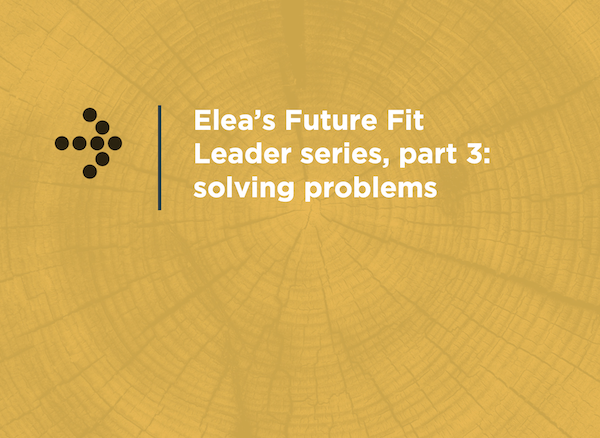Elea’s Future Fit Leader series, part 3: solving problems

The third session of Elea’s Future Fit Leader series took place recently online, led by Juliette Fourie, managing director of Elea within the OMT Group. This session, titled “Solving Problems”, explored how leaders can strengthen their decision-making and adaptability through deliberate, evidence-based problem-solving.
Juliette began by reminding participants that problem-solving isn’t about finding a quick fix. Rather, it’s a deliberate process that begins with clarity.
“It starts with defining the problem and getting absolute clarity about what’s really going wrong,” she said. “Too often, teams rush ahead before truly understanding the issue.”
Building on that, she outlined the full problem-solving cycle: defining, diagnosing, prioritising, selecting and implementing solutions.
“A brilliant solution means nothing without execution,” she added. “That’s where leadership, collaboration and accountability are truly tested.”
At the heart of the discussion was Elea’s Problem-Solving Framework, which forms part of the broader Elea Leadership Competence Model. Within this model, problem-solving is broken into four interconnected dimensions – Sourcing, Contemplating, Enabling Solutions and Performance Intensity – each representing a stage of the leadership journey from curiosity to action.
“Sourcing helps us understand the problem,” said Juliette. “Contemplating enables us to make sense of it. Enabling Solutions drives us to solve it creatively, and Performance Intensity ensures we sustain and measure success.”
Using the example of a manufacturing business facing a sudden increase in product defects, Juliette demonstrated how these dimensions work in practice.
“A sourcing-minded leader doesn’t jump to conclusions,” she explained. “They investigate, review data and talk to people. Then, through contemplation, they turn information into shared understanding. Only then do they enable solutions – empowering teams to co-create and innovate.”
She also highlighted the importance of maintaining Performance Intensity once a solution has been found.
“Leadership impact isn’t about one-off fixes,” she said. “It’s about continuous improvement, benchmarking performance and maintaining the standards that drive long-term success.”
Drawing inspiration from research by McKinsey & Company, Juliette introduced the idea of the dragonfly-eye view – a metaphor for holistic problem-solving.

“Dragonflies have 360-degree vision,” she said. “In the same way, great leaders view challenges from multiple perspectives. They widen the aperture, consider the ecosystem and see possibilities others might miss.”
This broader mindset, she argued, helps leaders navigate a world defined by uncertainty and disruption.
“In an environment where complexity is constant, problem-solving is no longer a technical skill – it’s a leadership mindset,” she said. “It’s about curiosity, creativity, accountability and relentless improvement.”
The webinar also examined how Elea’s leadership competencies align with the structured stages of problem-solving – Identify, Explore, Goals, Select, Implement and Evaluate. Juliette linked these to Elea’s measurable skills:
- Identify connects to Performance Intensity, through problem identification and analysis.
- Explore aligns with Sourcing, as leaders gather insights and investigate root causes.
- Goals relates to Contemplating, where leaders deliberate and define success.
- Select draws on Enabling Solutions, as leaders evaluate and decide on the best course of action.
- Implement and Evaluate return to Performance Intensity, focusing on improvement, benchmarking, and sustainable delivery.
Juliette also shared a striking comparison between leadership philosophies from Silicon Valley.
“For years, we celebrated ‘move fast and break things,’” she said. “It encouraged experimentation but often broke trust along the way. The better approach is ‘move fast and fix things’ – accelerate, but with responsibility.”
Citing leadership thinkers Anne Morriss and Frances Frei, she added: “The best leaders don’t slow down – they move fast and fix things. They build momentum while building trust.”
Here’s more from Anne Morriss:
Juliette closed the session by reminding attendees that effective problem-solving is not a task but a defining quality of leadership.
“In today’s fast-changing world, leaders are not judged by whether they face problems, but by how they solve them,” she said. “The leaders who thrive are not those who move recklessly, but those who move responsibly fast.”
The next session in the Future Fit Leader series will take place on 23 October 2025. It will focus on connection and collaboration, exploring how leaders build trust, empathy and influence in their teams.
For registration details, contact Juliette at [email protected]. To access the full Future Fit Webinar series, click here.